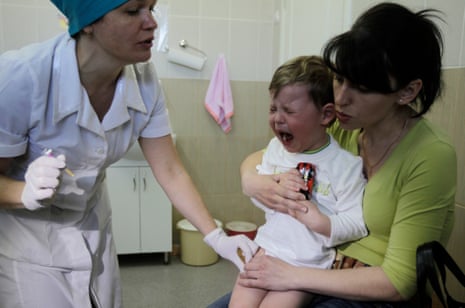A healthcare lobby group is arguing for the destruction of 3.7 million polio vaccines donated to Ukraine by the UN, despite the risk (pdf) that a new outbreak of the disease could spread across the country and into the EU.
The all-Ukrainian council for patients’ rights and safety has alleged the vaccines are unsafe, because the frozen vaccines partially thawed while in air transit to Ukraine from the manufacturer, Sanofi Pasteur in France. Although the World Health Organisation (WHO) says the transport and refreezing were carried out in line with international best practice, the complaint alleges that the process contradicts a set of Ukrainian guidelines that state the vaccines cannot be refrozen.
“We must absolutely destroy the vaccine, or pass it on to some poorer countries,” said Viktor Serdyuk, president of the council. “Good or bad – it does not matter. We should vaccinate safely and according to the protocol.”
The vaccines remain behind lock and key in government warehouses after the ministry of internal affairs launched an inquiry into whether they had been stored in the correct way. Ukrainian ministers are meeting this week to decide whether to release or incinerate the drugs.
The WHO says the vaccines are safe. Dr Dorit Nitzan, head of the organisation’s Ukraine office, said: “The way they’ve been stored is the normal practice. That’s how it’s been done all over the world.
“I keep telling the investigators, ‘These vaccines are the best you could have ever asked for – Canadian money, Unicef, pre-qualified by WHO, Sanofi Pasteur, made in France – what more do you want?’ But their view is that proper protocols must be followed. They just do that – but they [have forgotten] about the children.”
The move puts more than three million unvaccinated children at risk of the debilitating sickness. Two children, respectively aged 10 months and four years old, have already been paralysed after contracting polio in the first case of the disease in Europe since 2010. Hundreds more are believed to be carrying the virus, which could spread rapidly through a country where less than 50% of children and 14% of infants are inoculated against the disease.
“What we see is the tip of the iceberg. When two cases are presenting there are usually at least 200 carriers behind each one,” said Nitzan.
“There is no doubt we will see more cases. The outbreak is here, and it’s going to be huge – if nothing is done.”
The WHO is asking Ukraine to follow the internationally agreed outbreak response guidelines and declare a public health emergency. The crisis has prompted Bill Gates, a leading campaigner for the global eradication of polio, to phone the Ukrainian president, Petro Poroshenko, and make the case for distribution of the life-saving vaccines.
Some say the issue shines a light on the less-than-transparent nature of healthcare practices in Ukraine. The country’s health ministry believes some lobbyists are trying to destroy public confidence in overseas vaccines.
“They are targeting the international organisations that provided vaccines as humanitarian assistance,” said the deputy health minister Ihor Perehinets. “Someone doesn’t want to have procurement outsourced to international organisations – which are much more transparent while conducting procurement in Ukraine and abroad.”If the UN vaccines are destroyed, new ones will have to be purchased through Ukraine’s own procurement system.
The confirmed polio cases are in Zakarpattia oblast, the western-most region of Ukraine. The area borders Hungary, Poland, Romania and Slovakia, raising fears that the virus could find its way into unvaccinated communities inside the EU, such as refugees fleeing conflicts in Syria and Afghanistan.
“Polio virus is very good at finding susceptible children, no matter where they live,” said Oliver Rosenbauer, communications officer for the Global Polio Eradication Initiative, part of the WHO.
“In the early 1990s polio virus from India was imported into the Netherlands. Even though the country had high national coverage rates, the virus found its way into a community of vaccine-resistance, and this resulted in 71 children being paralysed for life by the disease.”
As the inquiry drags on, the UN fears the virus is spreading and mutating into more aggressive forms of the disease. But dire as the situation is, polio is just one symptom of the dismal state of Ukraine’s public health system.
According to Dr Olha Bohomolets, head of the parliamentary commission for healthcare in Ukraine, desperately underpaid health officials have for years been taking sweeteners to spend their budget on unnecessary pharmaceuticals instead of vital ones, resulting in a critical shortage of essential medicines.
“Doctors are getting $100 per month in Ukraine and nurses $50,” she said. “You can’t survive on this. Then a representative of a pharmaceutical company comes to the doctor and says: ‘OK, look, you prescribe this special medicine. You get 5% of the price from every box or tube sold.’ So the country is running out of medicine. We don’t have anything.”
While the UN’s efforts are focused on containing the virus, the WHO believes polio is likely to be just the first in a series of diseases to hit Ukraine if the government doesn’t start vaccinating immediately.
“This is only polio – you can imagine what’s going on with measles and mumps and pertussis and diphtheria,” said Nitzan.
“Then there is the real disaster that is going on with non-communicable diseases, the impact of which we will only see 10 or 20 years from now. The state is failing to provide the services that they are obliged to.”
